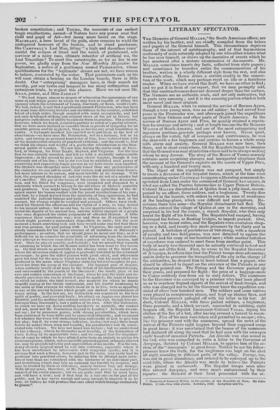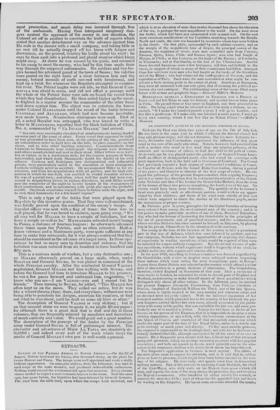LITERARY SPECTATOR.
General MILLER, when he entered the service of Buenos Ayres, though a very young man, was an old soldier : he had served four years in the Peninsular war, and afterwards joined the expeditions against New Orleans and other parts of North America. In the service of BuenoS Ayres and Peru, he quickly attained a reputa- tion for courage and activity ; and at length became the Sir 11013ERT WILSON of South America, and one of the most enterprising and ingenious partisan-generals perhaps ever known. Never quiet, always on the watch, full of resources and contrivances, he was the man with a few buglemen and sentries to harass a whole army with alarm and anxiety. General MILLER was now here, then there, and in short everywhere, till the Royalists began to imagine that the General was near akin to him who is said to be always seeking whom he may devour. The story of the Bravo of Venice scarcely contains more surprising changes and unexpected situations than the account of the General's exploits on the coasts of Upper Peru, with only a hundred and twenty men. The object of this expedition was not conquest, but simply to create a diversion of the Royalist forces, which at the time were concentrating under CANTERAC to oppose a liberating armament de- spatched from Lima under the command of GenerarALVARADO, in what are called the Puertos Intermedios in Upper Peru or Bolivia. Colonel MILLER disembarked at Quilca from a jolly-boat, accom- panied by an officer, three soldiers, and a bugleman. Twenty-five followed in the launch, with orders to return in case of resistance at the landing-place, which was 'difficult and precipitous. Re- sistance there was none—the Royalist detachment had fled. The Patriots entered the village of Quilca at one in the morning, and surprised in his bed the curate, a stanch Royalist, who then only learnt the flight of his friends. The Royalists had escaped, having destroyed the balsas, or floating bridges, to impede pursuit. One, however, was found entire, and the Royalists were overtaken sleep- ing in a field, and twenty-five made prisoners by the thirty sent in pursuit. A battalion of partideriaa of 900 strong, with a squadron of cavalry and two field-pieces, was now detached to oppose the Colonel and his army of one hundred men ; while another battalion of caca.dores was ordered to meet them from another point. This body of nearly two thousand men he actually contrived to beat and frighten out of the field. First, he wrote to the Royalist Governor of Arequipa, to inform him that the Patriot troops were advancing; and in order to preserve the tranquillity of the city in the change of the authorities, he desired him to leave behind him a piquet, who should be allowed to depart on the entrance of the Patriots in any direction pointed out. The Bishop and the Governor packed up their goods, and prepared for flight : the price of a baggage-mule to Cuzco suddenly rose from six to sixty dollars. The summons to the Governor was conveyed by a prisoner who had been placed so as to overhear feigned reports of the arrival of fresh troops, and who was charged not to let the Governor know the expedition con- sisted of above fourhundred men. The soldiers and some natives were placed in conspicuous places, and kept up blazing fires, and the liberated prisoner galloped off with his letter in his hat. At dusk, Colonel MILLER, with three picked soldiers, a bugleman, three peasants, and a black servant, succeeded in catching, eight leagues oft the Royalist Lieutenant-Colonel VIDAL, drying his clothes at the fire of a hut, after having crossed a torrent to recon- noitre. Five of his men were taken and permitted to escape ; who, lime the prisoner sent with the summons, spread the news of the arrival of the Patriots eight leagues beyond their supposed camp in great force : it was ascertained that the bearer of the summons had declared all along the road that he had seen with his own eyes eight hundred mounted Patriots. An Alcalde was also seized in his bed, who was compelled to write a letter to the Governor of Arequipa, dictated by Colonel MILLER, to apprise him of the ar- rival of the " insurgents " in great force. Neither he nor his fellow- prisoner knew the truth, for the bugleman was kept on the alert all night sounding in different parts of the valley. Forage, too, was cut in great abundance, and ordered to be conveyed up to the sand-hills, where the Alcalde was made to believe the Patriots were played in ambuscade. The Royalist troops soon after this entered Arequipa, and were much embarrassed by their reports : the General at their head proceeded with the ut- * Memoirs of General Miller, in the service of the Republic of Peru. By John Miller, 2 viols, tiVQ• with plates, London, 182d. Longman and Co, most precaution, and much delay was incurred through 'fear of the ambuscade. Having thus interposed imaginary dan- gers against the approach of the enemy in one direction, the Colonel setoff in another to ascertain the truth of reports which stated that another detachment was on the advance against him. He rode in the deserts with a small company, and taking little or no rest till he actually dropped off his horse with fatigue and drowsiness, on the ground, twisting his bridle about his wrist : he says he then sank into a profound and placid slumber which kings might envy. At dawn he was roused by his guide, and returned to his camp to meet the enemy, who had by this time made their way through the supposed ambuscades. Six soldiers and two bu- gles formed his advanced guard at the town of Scona ; his videttes were posted on the right bank of a river between him and the enemy, behind mounds of earth eovered with brushwood, and kept up a brisk fire whenever the Royalists attempted to examine the river. The Patriot bugles were not idle, so that General CAR- RATALA was afraid to cross, and did not effect a passage until the whole of the Patriot force were safe on board the vessel from which they had disembarked. He then sailed higher up the coast, to frighten in a similar manner the commander of the other force sent down against him. The object was to entertain the forces under Colonel MANZANEDO until the result of the battle between CANTERAC and ALVARADO, which had now become inevitable, was made known. Numberless stratagems were used. First of all, a noted Royalist was entrapped, who was forced to write a letter to MANZANEDO, reporting that the black battalion of Chile, No. 4, commanded by " EL INGLIS MILLER," had arrived.
" Retorts were constantly circulated of reinforcements having landed on some part of the coast or other. Every vessel that appeared in sight, or was pretended to have been seen, at the setting of the sun, produced an ostentatious order to light fires on the hills, to place peasantry on the shore, and to take other bustling measures. Communications from Canterac to Manzanedo were intercepted: the originals were detained, and others counterfeited and sent in their stead. Other letters were writ- ten in cipher, or in a mysterious style, for the express purpose of being intercepted, and which made Manzanedo doubt the fidelity of his own officers. Cordova and Rodriguez, two distinguished and influential priests, were particularly useful in the execution of these stratagems. Cordova willingly acted as secretary. He accompanied Miller in his ex- cursions, and from his acquaintance with all parties, and the high esti- mation in which he was held, was enabled to render essential services. He was of a jovial turn ; and often, when half the night had been con- sumed in despatching letters in various directions, he and Miller would pass the remainder of the night in hearty laughs at the strangeness of their productions, and in speculating with great glee upon the probable results. Daybreak sometimes warned them to throw aside the cigar, and to seek their hammocks for a few hours' repose."
This is only a type of the tricks that were played upon the Royalists by this inventive genius. That they were well maintained, was fatally proved upon the condition of the enemy's troops. A Royalist officer was sent with a flag of truce : the farce was so well played, that he was heard to exclaim, upon going away, " It's all very well for MILLER to have a couple of battalions, but we have a couple as well as he." MANZANEDO retreated from Chumpi to Pausa, a distance of fourteen leagues : he afterwards advanced three times upon the Patriots, and as often retreated. Half-a- dozen veterans and a Montonero party, were quite sufficient at any time to make him retrograde, for it was always contrived thatthey should be considered as the advance of a larger force. In these ope- rations he lost so many men by desertion and sickness, that his battalion was soon reduced from six hundred to three hundred and fifty men.
This is a curious mode of warfare, but a very destructive one ; as MILLER afterwards proved on a large scale, when, under BOLIVAR and General SUCRE, he was placed in command of the whole Peruvian cavalry. After the celebrated General VALDEZ eapitulated, General MILLER met him walking with SUCRE, and before the General had time to introduce MILLER to his prisoner, he ran a few paces forward and embraced him, exciaiminF, " I know who you are—I am VALDEZ—you and I cannot but be friends." Then turning to SUCRE, he added, "This MILLER has often kept us on the move. They called me active, but he was like a wizard (bruxo,) here, there, and everywhere, without our ever being able to penetrate his designs, ascertain his numbers, or find out what he was about, until he dealt us some sly blow or other."
The description of General VALDEZ is very striking ; but if on that account alone we were to quote it, we might fill our paper : for although there is a great deal that is dull and dry in these volumes, they are frequently relieved by anecdotes and narratives of much curiosity and value. We could point out a great number. The description of the passage of the Andes by the Peruvian army -under General SUCRE is full of picturesque interest. The character and adventures of Major LA TAPIA are. absolutely de- lightful ; and indeed every part of the work which bears the marks of General MILLERs own pen is well worth a perusal.



















 Previous page
Previous page